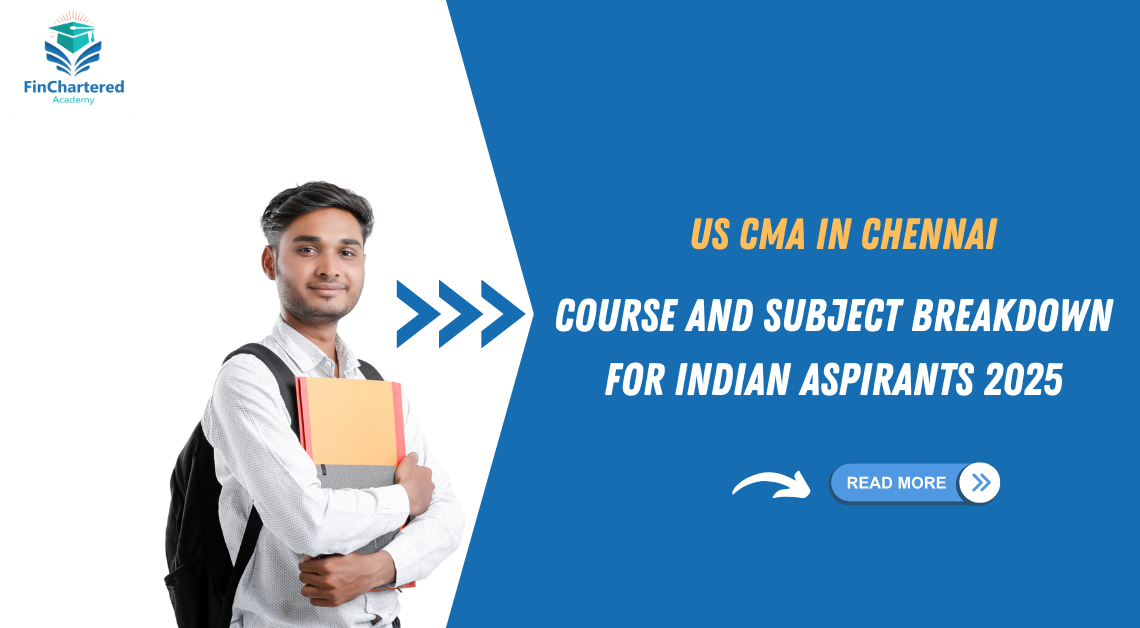US CMA in Chennai is a professional instrument credential in the management accounting and financial management fields. It signifies that the holder has knowledge in areas such as financial planning, analysis, control, decision support, and professional ethics. The basics of CMA provide certification, focus, education, experience, membership, etc.
Certified Management Accountant (CMA):
This is a professional certification in financial and management accounting. The certification is offered by the Institute of Management Accountants (IMA) in the United States. A CMA is widely recognized for their expertise in financial analysis, as well as their proficiency in strategic planning and effective decision-making.
Who can study the CMA?
Accounting and Finance Professionals and finance-related students are CA, B.com candidates also join the US CMA in Chennai.
Bachelor’s Degree Holders: A degree from an accredited institution is usually required.
Accounting and finance professionals: those with experience in accounting, finance, or management.
Students: Some pursue the CMA while still in school or shortly after graduating.
Career Changers: Professionals looking to shift into management accounting or finance roles.
CMA course completing Duration:
The US CMA institute in Chennai course duration to complete the CMA (Certified Management Accountant) typically ranges from 6 to 8 months. This includes studying for and passing the two exam parts, which many candidates complete within this timeframe depending on their study pace and other commitments.
Study Schedule: Full-time or part-time study.
Exam Preparation: Time needed to prepare for the two exam parts.
Work and Other Commitments: Balancing study with professional or personal responsibilities.
Candidates can prepare for each of the two exam parts in about 3-6 months on average, with the total duration varying widely based on individual circumstances.
US CMA in Chennai Eligibility:
Eligible for the CMA (Certified Management Accountant) course, candidates must fulfill the below requirements.
1.Educational Qualification: Candidates must hold a bachelor’s degree from an accredited institution in any discipline. Alternatively, if a candidate doesn’t have a bachelor’s degree, they may still qualify; however, this is possible only if they hold a relevant professional certification, such as CPA, CA, ACCA, etc.
2.Professional Experience: To meet the eligibility requirements, candidates must have at least two years of full-time work experience in financial management or management accounting; moreover, this experience is crucial for demonstrating practical expertise in the field. One can obtain this experience prior to or within seven years of passing the CMA examinations in India. The experience must be in roles that involve analysis, management, or accounting in finance.
3.IMA Membership: Candidates must be members of the Institute of Management Accountants (IMA). Membership provides access to resources, exam registration, and continuing education.
4.Adherence to Ethics Standards: Candidates must comply with the IMA’s Statement of Ethical Professional Practice, which emphasizes integrity, objectivity, confidentiality, and credibility in professional conduct.
CMA syllabus details:
The Certified Management Accountant (CMA) program divides into two parts, with each covering different aspects of management accounting and financial management. Two parts of the CMA subjects are divided into
Part 1: Financial Planning, Performance, and Analytics
This section focuses on the fundamentals of financial planning and analysis.
1.External Financial Reporting Decisions (15%)
- Financial statements
- Recognition, measurement, valuation, and disclosure
2.Planning, Budgeting, and Forecasting (20%):
- Strategic planning
- Budgeting concepts
- Forecasting techniques
- Annual profit
3.Performance Management (20%):
- Cost and variance measures
- Responsibility center and reporting segments
- Performance measures
4.Cost Management (15%):
- Measurement concepts
- Costing systems (job order, process, activity-based)
- Overhead costs
5.Internal controls (15%):
- Governance, risk, and compliance
- Internal audit function
- Control types and frameworks
6.Technology and Analytics (15%):
- Information systems
- Data governance
- Data analytics and visualization
Part 2: Strategic Financial Management
This section emphasizes strategic financial management, focusing on decision-making and strategy. The key topics include:
1.Financial Statement Analysis (20%):
- Basic financial statement analysis.
- Financial ratios
- Profitability analysis
2.Corporate Finance (20%):
- Risk and return
- Cost of capital
- Capital structure
- Dividend policy
3.Decision Analysis (25%):
- Cost/volume/profit analysis
- Marginal analysis
- Pricing decisions
4.Risk Management (10%):
- Enterprise risk
- Types of risk
- Risk mitigation strategies
5.Investment Decisions (10%):
- Capital budgeting process
- Discounted cash flow analysis
- Valuation of projects
6.Professional Ethics (15%):
- Ethical considerations in business
- IMA’s Statement of Ethical Professional Practice
- Ethical decision-making frameworks
These two parts collectively equip US CMA professionals in Chennai with the essential skills for effective management accounting and financial decision-making, enabling them to tackle financial challenges within their organizations.
Management accounting and financial decision-making, therefore, equip CMAs to effectively handle financial challenges within their organizations.
CMA Exam Structure:
The CMA (Certified Management Accountant) exam consists of two parts, each focusing on different areas of management accounting and financial management. Here’s an overview of the exam structure:
Exam Structure:
Two Parts: The CMA exam is divided into two parts:
Part 1: Financial Planning, Performance, and Analytics
Part 2: Strategic Financial Management
Exam Format:
Duration: There are 4 hours in each section of the exam.
Number of Questions:
100 Multiple-Choice Questions (MCQs): The first 3 hours are dedicated to answering multiple-choice questions.
2 Essay Questions: After completing the MCQs, the final hour is reserved for essay questions. Each essay section typically includes several questions that require detailed written responses, along with calculations and explanations to support the answers.
Scoring:
Passing Score: A score of 360 out of 500 is required to pass each part of the exam.
MCQs: You must answer at least 50% of the MCQs correctly to proceed to the essay section.
Essays: The essay section is scored based on content, clarity, and organization. Even if time runs out during the essay portion, any completed answers will still be scored.
Exam Windows:
There are three testing windows available for the CMA exam each year.
- January/February
- May/June
- September/October
Candidates can choose when to take each part within these windows, and both parts can be taken in any order.
Preparation Time:
It’s recommended to spend around 100-150 hours studying for each part of the exam.
This structure ensures a comprehensive assessment of a candidate’s knowledge and skills in management accounting and financial management.
Conclusion:
The CMA (Certified Management Accountant) course prepares professionals with advanced skills in financial management and strategic decision-making. It covers critical areas such as financial planning, performance management, and corporate finance. The US CMA in Chennai designation signifies expertise and readiness for leadership roles in management accounting, enhancing career prospects and contributing to organizational success.








